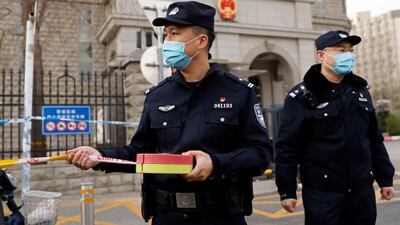The trial for Michael Kovrig, the Canadian detained more than two years ago in China on espionage charges, started on Monday with relations between Ottawa and Beijing in freefall.
The hearing comes days after the closed-door trial of another Canadian man, with both detained in apparent retaliation for Canada's arrest on a US extradition warrant of Huawei executive Meng Wanzhou.
On Monday police cordoned off an area outside the Beijing court as Canadian diplomats were denied entry and turned away.
Mr Kovrig, a former diplomat, was detained in 2018 and formally charged last June with spying at the same time as his compatriot, businessman Michael Spavor.
Jim Nickel, the charge d'affaires of the Canadian embassy in Beijing, told reporters that the hearing had started and that access for diplomats "has been denied".
"We're very troubled by the lack of access and lack of transparency in the legal process," he said.

A court official told reporters no entry was allowed because the trial is a national security case.
Representatives of 26 countries had gathered outside the building on Monday, Mr Nickel said, and were "lending their voice" for Mr Kovrig's immediate release.
The US is "deeply concerned at the lack of minimum procedural protections granted the two Canadian citizens", William Klein, acting deputy chief of mission of the US Embassy in Beijing, told media outside the court.
Canadian diplomats were also barred from attending Mr Spavor's trial in the northern city of Dandong on Friday, which lasted less than three hours and ended without any verdict being announced.
Following that closed-door hearing, Canadian Prime Minister Justin Trudeau slammed the two men's detention as "completely unacceptable, as is the lack of transparency around these court proceedings".
The cases have sent relations between Ottawa and Beijing to their lowest point in decades.
The court dates for the two Canadians come as an extradition hearing for Ms Meng enters its final months, and alongside heated high-level talks between the US and China in Alaska.
Ms Meng, whose father is Huawei founder and chief executive Ren Zhengfei, has been fighting extradition to the US on charges that she and the company violated US sanctions on Iran and other laws.
Canada's former ambassador to China, Guy Saint-Jacques, said he expected Mr Kovrig's trial to also be short.
"China does not even try to make this look like a real trial as evidence is not shared with the defence and the judge does not even take the time to review it," he said ahead.
"It just confirms that the process is pre-ordained by the Communist Party and this is a political case."
China's judicial system convicts most people who stand trial and the two men face up to life in prison if found guilty of "espionage" and "providing state secrets".
They have had almost no contact with the outside world since their detention, and virtual consular visits only resumed in October after a nine-month hiatus that authorities said was due to the coronavirus pandemic.
Beijing has insisted the detention of the two Canadians is lawful, while calling Ms Meng's case "a purely political incident".
"The message to the USA is: if you want to help the Canadians, make sure that Meng is returned quickly to China," Mr Saint-Jacques said.

